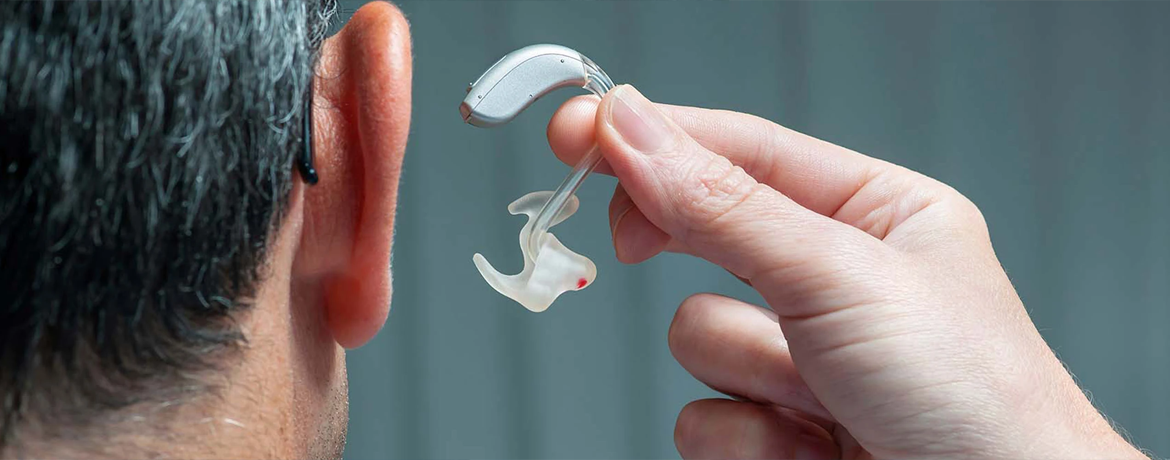
Older adults who get a hearing aid for a newly diagnosed hearing loss have a lower risk of being diagnosed with dementia, depression or anxiety for the first time over the next three years, and a lower risk of suffering fall-related injuries, than those who leave their hearing loss uncorrected, a new study finds.
Only 12% of those who have a formal diagnosis of hearing loss actually get the devices even when they have insurance coverage for at least part of the cost, the study shows. It also reveals gaps in hearing aid use among people of different racial & ethnic backgrounds, geographic locations and genders.
The findings, made by a University of Michigan team using data from nearly 115,000 people over age 66 with hearing loss & insurance coverage through a Medicare HMO between 2008 and 2016, are published in the Journal of the American Geriatrics Society.
Unlike traditional Medicare, Medicare HMOs typically cover some hearing aid costs for members diagnosed with hearing loss by an audiologist.
Elham Mahmoudi, MBA, PhD, the U-M Department of Family Medicine health economist who led the study, says the study confirms what other studies have shown among patients studied at a single point in time but the new findings show differences emerging as time goes on.
We already know that people with hearing loss have more adverse health events & more co-existing conditions, but this study allows us to see the effects of an intervention and look for associations between hearing aids and health outcomes,” she says. “Though hearing aids can’t be said to prevent these conditions, a delay in the onset of dementia, depression, anxiety & the risk of serious falls, could be significant both for the patient and for the costs to the Medicare system.
The study shows that men with hearing loss were more likely to receive a hearing aid — 13.3% compared with 11.3% of women. Only 6.5% of people of Latino heritage received a hearing aid for their hearing loss, compared with 9.8% of African-Americans & 13.6% of whites.
Nearly 37% of people with hearing loss who lived in the north-central part of the country, as designated by the Census Bureau, used a hearing aid, compared with just 5.9% of people in the mountain states. Differences in diagnosis – When the researchers looked at the path that patients who received hearing aids took over three years, compared with those who didn’t get the devices, significant differences emerged.
In all, the relative risk of being diagnosed with dementia, including Alzheimer’s disease, within three years of a hearing loss diagnosis was 18% lower for hearing aid users. The risk of being diagnosed with depression or anxiety by the end of three years was 11% lower for hearing aid users, and the risk of being treated for fall-related injuries was 13% lower. The study also confirms previous studies’ findings that people with hearing loss had much higher rates of dementia, depression and fall injuries than the general population.
The reasons for this are complicated & can include loss of social interaction, loss of independence, loss of balance and less stimulation to the brain. Some researchers also believe that the loss of nerve impulses from the ear to the brain, and loss of cognitive ability leading to dementia, could be part of the same ageing process.
Hearing loss has also been associated with atrophy of brain tissue in auditory regions, potentially from lack of use. People who can’t hear well tend to be less likely to go out and engage with others socially too, which is another known risk factor for dementia. It’s possible to imagine any of these processes leading to cognitive decline. “The brain is made up of all these interconnected networks, and if you throw off the balance a little bit over years and years, that may have these widespread effects that are hard to measure clearly,” says Jonathan Peelle, an associate professor of otolaryngology at Washington University, in St. Louis.
If that’s the case, Lin says, “there’s every reason to think if you treat hearing loss, that those interventions could directly modify those pathways,” preventing that decline. (There is no evidence yet to say whether people who are deaf or hard of hearing and develop alternative ways to communicate have any greater risk of developing cognitive problems.) But it’s harder to see how those processes might relate to the buildup of amyloid and tau proteins that characterize Alzheimer’s disease specifically. “You’re never going to stop Alzheimer’s disease with a hearing aid,” Peelle says, “but you may help people to function better by supporting their cognition that way.”
Indeed, researchers believe that Alzheimer’s and other types of dementia result from a combination of factors, a majority of the genetic (scores of genes have been identified that may increase or decrease risk). But other risk factors have to do with a person’s environment and lifestyle, which includes hearing. Treating impaired hearing thus has the potential to decrease the number of people living with the disease. The National Institute on Aging is currently funding the first randomized control trial, led by Lin, to see whether older adults who get hearing aids (compared with those who participate in a program to manage nutrition, diet and exercise) are less likely to develop dementia.
 +919910630377
+919910630377